外研版英语必修一_Module_2_现在分词语法
高中英语外研版语法总结-必修
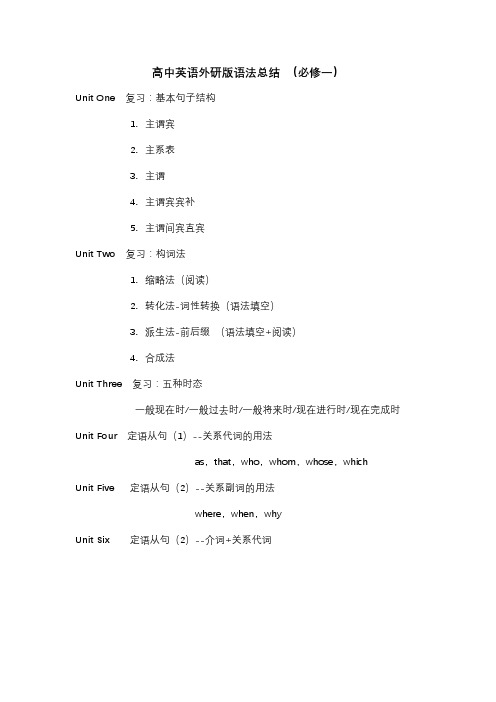
Unit One 复习:基本句子结构1.主谓宾2.主系表3.主谓4.主谓宾宾补5.主谓间宾直宾Unit Two 复习:构词法1.缩略法(阅读)2.转化法-词性转换(语法填空)3.派生法-前后缀(语法填空+阅读)4.合成法Unit Three 复习:五种时态一般现在时/一般过去时/一般将来时/现在进行时/现在完成时Unit Four 定语从句(1)--关系代词的用法as,that,who,whom,whose,whichUnit Five 定语从句(2)--关系副词的用法where,when,whyUnit Six 定语从句(2)--介词+关系代词Unit One 情态动词(1)--情态动词的功能Unit Two 情态动词(2)can/could;may/might;will/would;shall/should等be able to dodare do 胆敢Unit Three 非谓语—不定式作定语和结果状语Unit Four 非谓语—现在分词作状语状语:时间;地点;原因,结果,条件,让步,伴随,方式等Unit Five 非谓语—现在分词作定语Unit Six 非谓语—现在分词,不定式和过去分词作补语Unit One 非谓语—过去分词作状语(被动,完成)Unit Two 非谓语—过去分词作定语(被动,完成)Unit Three 现在完成时的被动语态have/has been doneUnit Four 现在进行时的被动语态be being doneUnit Five 过去将来时1.宾语从句2.叙述过去的事情3.非真实,虚拟语气Unit Six 省略1.and/but 并列句2.状语从句3.定语从句4.名词性从句。
外研版高中英语必修一词汇构词法讲解汇编

外研版高一英语必修一Module 1词汇构词法讲解1.academic=academ学术+ic(形容词后缀)academy n.学院,学术团体;2.province=pro-(前缀,表示“向前,在前,变体”pur-”)+vince(vict-,vinc-=conquer, overcome, 表示“征服,克服”)procincial adj.省的,州的,外地的;3.enthusiastic=en-(前缀,加强、更)+thusias-(神,热)+tic(形容词后缀)enthusiasm n. 巨大的热情,热心;4.amaze=a-(前缀,表加强)+maz(e)(迷宫,迷惘)+-ing(形容词后缀,物作主语,...的)amazed adj. 吃惊的;惊讶的rmation=inform(通知,告知)+ation(名词后缀)6.website=web(网)+site(站点)7.brilliant=brilli(发光)+ant(形容词后缀)prehension=com-(共同)+pre(往前)+hend(抓住)+sion(名词后缀)comprehend v. 理解comprehensive adj. 有理解力的, 广泛的,综合的9.instruction=in-(前缀,内,里)+struct(建立)+ion(名词后缀)instruct v.指导,指教,命令10.method=me(走)+thod(太好了)11.bored=bore(v.使厌烦)+(e)d(形容词后缀)boring adj.无聊的12.embarrassed=em(前缀,进入)+barrass(套子)+ed(形容词后缀)embarrass v.使难堪embarrassing adj. 令人尴尬的,令人难堪的,物作主语13.attitude=att(能力,倾向)+itude(抽象名词后缀,...的度)14.behaviour=be(是,值)+hav(抓,取,拥有)+iour(抽象名词后缀)behave v. 表现15.previous=pre(前缀,在...前面)+vious(形容词后缀,有...性质的)16.description=de(前缀,去)+scribe(写)+tion(名词后缀)v. describe17.见418.见12.19.technology=techno(技术)+logy(...学,...论)technical adj. 技术性的20.impress=(前缀:向内)+press(词根:压)impression n.印象21.correction=cor(前缀:一同,合并)+rec(词根:使变直)+tion(名词后缀)correct v./adj. 改正,正确的incorrect adj. 不正确的22.encouragement=en(前缀:进入)+cour(词根:心)+age(抽象名词后缀:...的活动,...行动的结果)+ment(抽象名词后缀)courage n.勇气encourage v.鼓励23.enjoyment=en(前缀:进入)+joy(词根:快乐)+ment(抽象名词后缀)enjoy v. 享受,热爱24.fluency=flu(流)+ency(抽象名词后缀:表示性质,状态,情况等) fluent adj.流利的,流畅的25.misunderstanding=mis(否定前缀)+under(前缀,下面,中间)+stand(站)+ing(形容词后缀) understand v.理解26.disappointed=dis(否定前缀)+ap(去)+point(点)+ed(形容词后缀) appoint v.任命,委派(到指定的地点去)disappoint v. 使失望disappointing adj. 令人失望的,物作主语27.见2628.system=syst(词根:组织,系统)+em(词根:拿,买)29.teenager=teen(词根:青少年)+age(词根:时代,年纪)+(e)r(名词后缀) teenage adj. 十几岁的,青少年的30.disappear=dis(否定前缀)+ap(前缀:加强意义)+pear(词根:出现)appear v.出现31.move=mov(移动)+e(动词后缀)movement n.运动32.assistant=as(前缀:临近)+sist(词根:站)+ant(名词后缀)assist v.援助33.cover v. 包含n.盖子,封面34.diploma=di(前缀:二)+pl(折叠)+oma(名词后缀)来自罗马词汇,原义折叠的官方文件,后引申为毕业文凭,毕业证书外研版高一英语必修一Module 2词汇构词法讲解1.amusing=a(前缀:加强语气)+mus(e)(词根:娱乐)+ing(形容词后缀)娱乐性强的就是有趣的,可笑的。
2019-2020年外研版高中英语必修一讲义:Module+1.Section+Ⅱ Grammar—
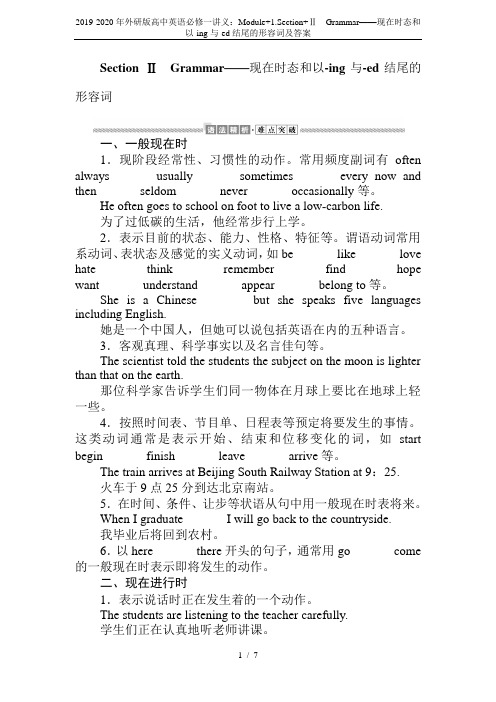
Section ⅡGrammar——现在时态和以-ing与-ed结尾的形容词一、一般现在时1.现阶段经常性、习惯性的动作。
常用频度副词有often always usually sometimes every now and then seldom never occasionally等。
He often goes to school on foot to live a low-carbon life.为了过低碳的生活,他经常步行上学。
2.表示目前的状态、能力、性格、特征等。
谓语动词常用系动词、表状态及感觉的实义动词,如be like love hate think remember find hope want understand appear belong to等。
She is a Chinese but she speaks five languages including English.她是一个中国人,但她可以说包括英语在内的五种语言。
3.客观真理、科学事实以及名言佳句等。
The scientist told the students the subject on the moon is lighter than that on the earth.那位科学家告诉学生们同一物体在月球上要比在地球上轻一些。
4.按照时间表、节目单、日程表等预定将要发生的事情。
这类动词通常是表示开始、结束和位移变化的词,如start begin finish leave arrive等。
The train arrives at Beijing South Railway Station at 9:25.火车于9点25分到达北京南站。
5.在时间、条件、让步等状语从句中用一般现在时表将来。
When I graduate I will go back to the countryside.我毕业后将回到农村。
6.以here there开头的句子,通常用go come 的一般现在时表示即将发生的动作。
外研版高一英语上册Unit 1 重点语法Grammar 句子成分和句子结构

Unit 1 A new start单元重点语法练习句子成分和句子结构一、单项选择1.Tom is looking forward to meeting the new exchange student.A.主语B.谓语C.直接宾语D.间接宾语2.The school adviser helped me choose the suitable ones.A.主语B.表语C.宾语D.宾补3.I feel awkward.A.主语B.谓语C.宾语D.表语4.The guy next to me tried to talk to me the whole time.A.主语B.谓语C.宾语D.表语5.He enjoys reading.划线部分是什么成分________A.P B.OC C.O D.Ad 6.They painted the door green.划线部分是什么成分________A.Ad B.OC C.IO D.DO 7.“The news makes me feel very happy.” The structure of this sentence is “_______”. A.主语+谓语+宾语B.主语+谓语+间接宾语+直接宾语C.主语+谓语+表语D.主语+谓语+宾语+宾语补足语8.请看句子判断划线部分属于哪种句型:Mr. Green will give us a speech on how to learn English well.A.S+V+O+A B.S+V+O C.S+V+O+C D.S+V+IO+DO 9.He passes her nothing.A.S V O B.SV IO DO C.S V A D.S V 10.He found his new book stolen.A.S V O B.SV IO DO C.S V O C D.S V P 11.What is the sentence pattern (句型) of the sentence “He told us a funny story.”?A.S V A B.S V O C.S V IO DO D.S V O A 12.The man never rides a bike.A.SV B.SV A C.SVP D.SVO 13.Her face turned red.A.SV B.SVIODO C.SP D.SVO14.He noticed a man enter the room.A.SVOO B.SOA C.SV A D.SVOC15.The river has gone dry.A.SVO B.SVP C.SV A D.SV16.It matters a lot.A.SVO B.SV A C.SVP D.SV17.She ordered herself a new dress.A.SVOA B.SVP C.SVOO D.SVOC18.Please analyze the structure of the sentence; “He started an IT company after graduation.”A.SVOC B.SV A C.SVOA D.SPA19.Please leave the lights on when you walk out of the room.What sentence element does the underlined part serve as?A.adverbial (状语)B.complement (补语)C.attributive (定语)D.appositive (同位语)20.I enjoyed the evening when we stayed together by the sea.What sentence element (句子成分) does the underlined part serve as?A.adverbial (状语)B.complement (补语)C.attributive (定语)D.appositive (同位语)21.The sentence pattern of “I enjoy living in Gansu.” is ________.A.S+V+O B.S+V+PC.S+V +IO+ DO D.S+V +DO+ OC22.Research indicates that eating habits are changing fast.A.示意B.显示C.建议D.表明23.To prevent harmful habits like these from dominating a teenager’s life is essential. 划线部分在句于中作什么成分A.主语B.谓语C.定语D.状语24.Robin, a rocket scientist, agrees and thinks starting with Mars makes the most sense.句子中非谓语动词是:A.agrees B.thinks C.starting D.makes25.In fact, an art movement called the “Mission School” started here. 句子中的谓语动词是________。
新教材 外研版高中英语必修第一册全册各单元知识点提炼汇总(单词短语句型语法等详解及扩展)
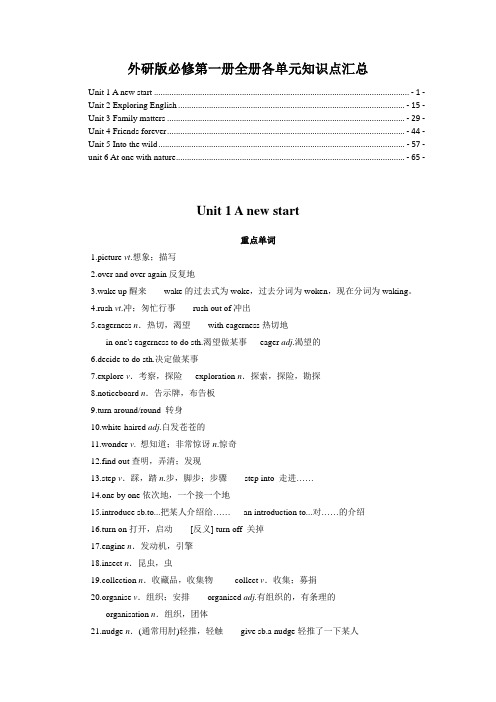
外研版必修第一册全册各单元知识点汇总Unit 1 A new start .................................................................................................................... - 1 - Unit 2 Exploring English ....................................................................................................... - 15 - Unit 3 Family matters ............................................................................................................ - 29 - Unit 4 Friends forever............................................................................................................ - 44 - Unit 5 Into the wild ................................................................................................................ - 57 - unit 6 At one with nature........................................................................................................ - 65 -Unit 1 A new start重点单词1.picture vt.想象;描写2.over and over again反复地3.wake up醒来wake的过去式为woke,过去分词为woken,现在分词为waking。
外研版高一英语必修1 Module 2 基础知识和默写 含答案
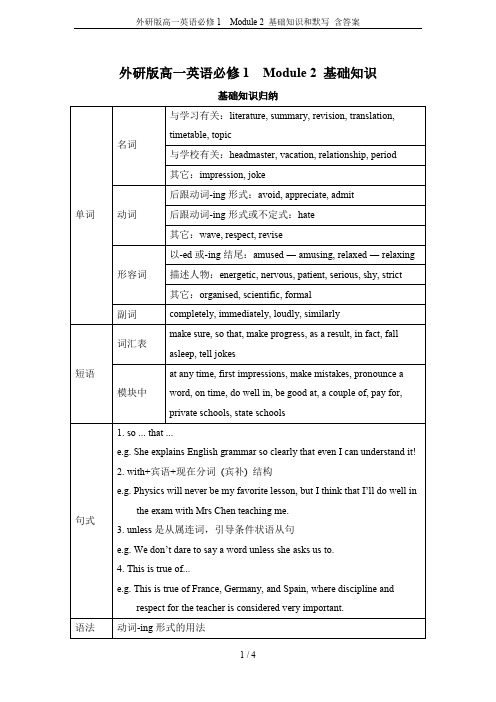
外研版高一英语必修1 Module 2 基础知识基础知识归纳基础知识默写基本单词1. _____________vt. (故意) 避开2. _____________n.印象3. _____________n.文学4. _____________n.时间表5. _____________n.纪律6. _____________adj.正式的7. _____________n.话题;题目8. _____________vt. 挥(手); 招(手)9. _____________n.一段时间派生单词10. _____________vt. 讨厌;不喜欢_____________n. 厌恶;憎恨11. _____________adj. 有趣的;可笑的_____________ vt. 使愉快_____________n. 愉快;有趣12. _____________adj. 精力充沛的_____________ n. 精力;能量13. _____________adj. 聪明的_____________ n. 智力;脑力14. _____________adj. 有组织的;有系统的_____________ vt. 组织_____________n. 组织15. _____________adj. 耐心的_____________n. 耐心_____________adj. 不耐烦的16. _____________vt. 感激_____________ n. 感激;赏识17. _____________vt. 承认_____________ n. 进入权,入场券18. _____________n. 总结;摘要;提要_____________ vt. 总结19. _____________vt. & n. 尊敬;尊重_____________ adj. 表示尊敬的;有礼貌的_____________ adj. 正派的;体面的20. _____________n. 关系_____________ n. 关系;亲戚;亲属_____________ vt. 与……有关联短语1. 对……有耐心____________________2. 对某人要求严格____________________3. 确定;确信;查明;弄清楚____________________4. 结果____________________5. 取得进步____________________6. 犯错误____________________句型1. so ... that ...e.g. She explains English grammar so clearly that even I can understand it!2. with+宾语+现在分词(宾补) 结构e.g. Physics will never be my favorite lesson, but I think that I’ll do well in the examwith Mrs Chen teaching me.3. unless是从属连词,引导条件状语从句e.g. We don’t dare to say a word unless she asks us to.4. This is true of...e.g. This is true of France, Germany, and Spain, where discipline and respect for theteacher is considered very important.考答案:基础知识默写基本单词1. avoid2. impression3. literature4. timetable5. discipline6. formal7. topic8. wave9. period派生单词10. hate hatred 11. amusing amuse amusement 12. energetic energy13. intelligent intelligence anized organize organization15. patient patience impatient 16. appreciate appreciation17. admit admission 18. summary summarize19. respect respectful respectable 20. relationship relation relate短语1. be patient with2. be strict with3. make sure4. as a result5. make progress6. make mistakes。
新外研版高中英语必修一Unit2ExploringEnglish知识点总结
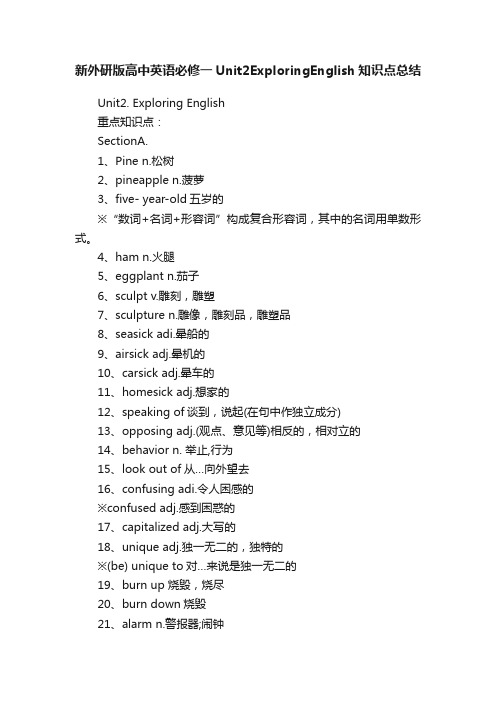
新外研版高中英语必修一Unit2ExploringEnglish知识点总结Unit2. Exploring English重点知识点:SectionA.1、Pine n.松树2、pineapple n.菠萝3、five- year-old五岁的※“数词+名词+形容词”构成复合形容词,其中的名词用单数形式。
4、ham n.火腿5、eggplant n.茄子6、sculpt v.雕刻,雕塑7、sculpture n.雕像,雕刻品,雕塑品8、seasick adi.晕船的9、airsick adj.晕机的10、carsick adj.晕车的11、homesick adj.想家的12、speaking of谈到,说起(在句中作独立成分)13、opposing adj.(观点、意见等)相反的,相对立的14、behavior n. 举止,行为15、look out of从…向外望去16、confusing adi.令人困感的※confused adj.感到困惑的17、capitalized adj.大写的18、unique adj.独一无二的,独特的※(be) unique to对…来说是独一无二的19、burn up 烧毁,烧尽20、burn down烧毁21、alarm n.警报器;闹钟22、go off(警报器等)突然发出巨响23、reflect v显示,反映24、creativity n.创造性,创造力25、visible adj.看得见的,可见的26、wind up给(机械)上发条;使(活动、会议等)结束原文长难句分析:1、Have you ever asked yourself why people often have trouble learning English?--- why引导宾语从句,作ask的宾语※have trouble(in) doing sth.做某事有困难2、Neither is there pine nor apple in pineapple.---“Neither/Nor+助动词/连系动词be/情态动词+另一主语表示上述否定情况也适用于该主语。
高中英语外研版必修一《Section ⅡGrammar——现在时态和以-ing与-ed结尾的形容词》

ow to pronounce (pronunciation) this word? 8.The whole family were having a happy get-together wh
(disappoint) 9.When hearing the surprising news that Michael Jackso
n passed away they were surprised to look at each other. (surprise)
10.He was worried about his son.(worry)
二、现在进行时 1.表示说话时正在发生着的一个动作。 The students are listening to the teacher carefully. 学生们正在认真地听老师讲课。 温馨提示 时间状语为 now at present at the moment; at nine o'clock 等;有时还可以有像 look,listen 等提示语。
not just survival. 4.Her explanation (explain)did not satisfy the teacher.
5.He speaks English and French with equal fluency (flue nt).
6.A misunderstanding (understand) was the beginning of
外研版 高中英语 必修一
Section Ⅱ Grammar—— 现在时态和以ing与ed结尾的形容词
- 1、下载文档前请自行甄别文档内容的完整性,平台不提供额外的编辑、内容补充、找答案等附加服务。
- 2、"仅部分预览"的文档,不可在线预览部分如存在完整性等问题,可反馈申请退款(可完整预览的文档不适用该条件!)。
- 3、如文档侵犯您的权益,请联系客服反馈,我们会尽快为您处理(人工客服工作时间:9:00-18:30)。
外研版英语必修一_Module_2_现在分词语法
1)直接接动名词的有: admit, avoid, advise, allow, appreciate, consider(考虑), delay,
enjoy, escape, fancy, finish, forbid, imagine, keep, mind, permit, practise, risk, suggest,
2)直接接动名词的短语有: feel like, give up, can’t help, be used to, keep on, insist
on, look forward to, put off, devote…to , stick to, object to, thanks to, be busy in, get down to, have some trouble/difficulty /problems(in)
e.g. I am looking forward to seeing you. 我盼着再见到你。
The book advised taking more exercise. 医生建议多运动。
.
The boy refused to admit stealing my money. 这个男孩拒绝承认偷了我的钱。
We missed the 5:30 bus, which means waiting for another hour. 我们误了5:30的班车,这意味着还得等一个小时。
.
I really enjoyed working on the farm. 我真的喜欢在农场干活。
She had finished listening to the new. 她听完了新闻。
注:①有些动词,如: remember. forget, stop, try, mean,regret 等,后既可以跟动名词,也可以跟动词不定式,但意义不同。
remember doing sth. 记得曾经做过某事(动作已发生)
remember to do sth. 记住做某事(动作还没有发生)
I remember seeing you somewhere in Beijing. 我记得在北京什么地方见到过
你.
Do you remember to post the letter? 你记住寄这封信了吗?
forget doing sth 忘记曾经做过某事(动作已发生)
forget to do sth 忘记做某事(动作还没有发生)
I shall never forget hearing her singing that song. 我再也不会忘记听她唱那支
歌的情景.
I have forgotten to bring my umbrella. 我忘了带伞.
stop doing 停止做某事
stop to do sth 停下来去做某事
Please stop doing. 请不要说话.
They stopped to listen, but there was no more sound. 他们停下来一听,但已经没有什么声音了。
try doing 试着做某事(看行不行)
try to do sth 尽力做某事
Why not try doing it some other way? 何不用其他办法试一试?
mean doing sth 意味着做某事
mean to do sth 打算做某事
That will mean waiting another hour. 那意味着还要等一个小时。
What do you mean to do with it? 你打算把它怎么处理?
regret doing 对某事感到抱歉
regret to do sth 后悔做过某事
I regret to tell you that you failed the test. 我遗憾的告诉你你没有通过考试。
I regret lending him so much money. He never paid me back. 我很后悔借给他那么多钱。
他从来没有还过我。
②动词like , love, prefer 后接不定式或动名词作宾语均可。
如表示经常的动作可用动名词,如表示具体的行为常用动词不定式。
但要注意:如果like, love, prefer前有would/should 时后面则接动词不定式。
如:
I like swimming, but I don’t like to swim this afternoon. 我喜欢游泳,但我今天下午不喜欢游泳。
I’d like to go swimming this weekend. 本周我愿意游泳。
③begin, start, continue 后跟不定式和动名词,通常没有差别。
但在下列三种情况下,其后需用动词不定式:
A.当begin/start 用于进行时时;
B.当begin/start的主语是物时;
C.当其后的动词为不可以用于进行时的表示心理活动或精神状态的动词
时。
④need 表示“需要”,require表示“要求”,want 表示“想要”时后面接动名词或to be done即:
sth need/require/want doing/to be done
The house wants/needs/requires repairing/to be repaired
⑤动名词有时可有自己的逻辑主语,构成动名词的复合结构one(’s)doing sth,
其中其逻辑主语不可使用主格代词。
Would you mind my opening the door? 我打开门你介意吗?
牛刀小试
1.In some parts of London, missing a bus means________ for another hour.
A.waiting
B. to wait
C. wait
D. to be waiting
2.The discovery of new evidence(证据) led to ____________________.
A.the thief having caught
B.catch the thief
C.the thief being caught
D.the thief to be caught
3.One learns a language by making mistakes and ______ them.
A.correct
B. correcting
C. corrects
D. to correct
4.She meant _____ but the look on your face suggested “No”.
A.explaining
B. to explain
C. explanation
D. to be explained
5.--- When did you go to the States?
--- I remember _____ there when I was ten.
A.having taken
B. to be taken
C. being taken
D. to take
6.He is so busy that he can’t help _____ the classroom.
A.cleaning
B. to cleaning
C. to clean
D. cleaned
7.–- I have been knocking the door, but no one answers.
--- Why not ____ at the back door?
A.try knocking
B.try to knock
C.to try knocking
D.to try to knock
8.As a young man from a rich family, can you imagine ______ in such a small and
dirty place?
A.to work
B. yourself to work
C. working
D. work
9.My uncle is considering ______ his heath.
A.improve
B. to improve
C. improving
D. to be improved
10.We should keep ________ English every day.
A.to practise speaking
B. practise speaking
C. practising speaking
D. practising to speak
The key:1A 2C 3B4B 5C 6C 7D 8C 9C 10. C。
